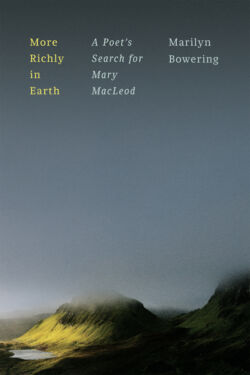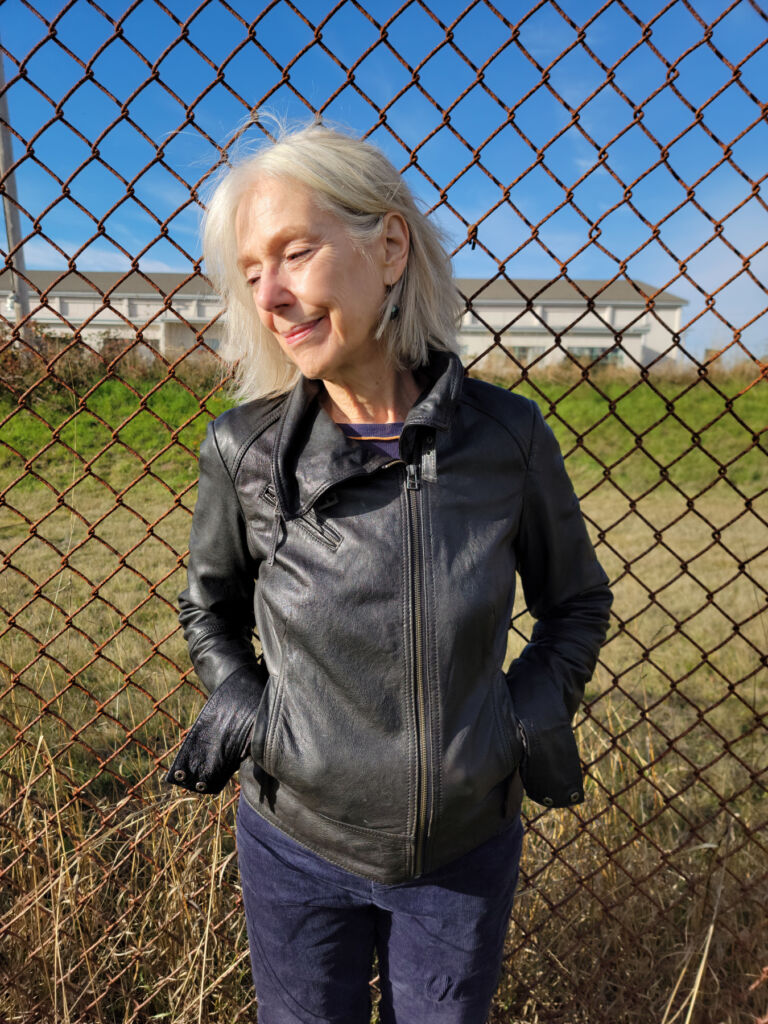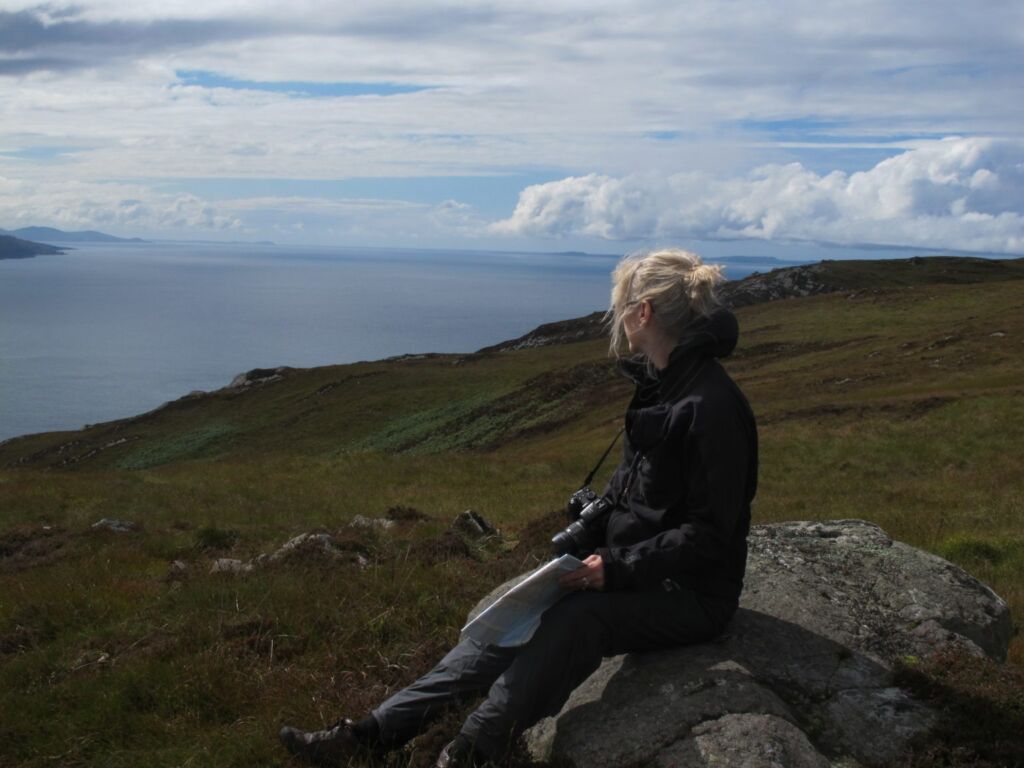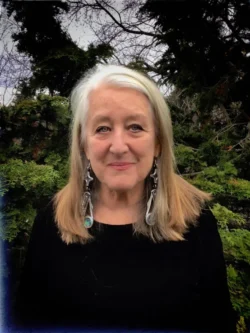‘Obscurity is the fate of the poet’
More Richly in Earth: A Poet’s Search for Mary MacLeod
by Marilyn Bowering
Montreal: McGill-Queen’s University Press, 2024
$34.95 / 9780228021124
Reviewed by Linda Rogers
*

“Much we long for what we lack” begins the poem and the book. The enigmatic Gaelic poet, Mary MacLeod, is the subject of Marilyn Bowering‘s memoir/biography, a decade of introspective study. It is a quest in the compost of dreams, where poets forage for truth.
In the company of her almost silent Scottish partner “El,” the mapmaker, his Spanish suffix objective in her feminist journey, “el” meaning “he” in Spanish and “deity” in Hebrew from whence it came. “He for God only, she for the god in him” aside, it is significant. This El is her companion in a search for the truth about a lady poet who was buried upside down for her audacity, inhabiting spells, the secure domain of gentlemen like Homer and dudes spinning gospel in holy books, a witch.
Burn, baby, burn, they must have said and this is the fire in Bowering who, despite her cartographer empowered by holy sacrament to accompany her on her journey to his Scottish home, not hers, is on a feminist re-investigation of the legacy of a lost lady poet.
MacLeod came from “good” family, like Jane Austen and her subjects, doomed to footnotes, relegated to the obtuse job definition of “governess” or “nurse” to more affluent relations should they fail to make significant marriages.
What is with El, I asked my husband and he responded, “Elcock” because he is my best editor, a nerd, a speller. I have always thought of the very present Michael as Alcock. We can be grateful she adheres to the first syllable or this tragic journey may have transformed into comedy, and comedy it is not. Not yet, although we are working on it, because comedy is the transformation of tragedy, the impetus for this feminist journey.
So, with El she traverses the place names of Mary’s legendary life, maybe ninety-two or possibly one hundred and three years of witnessing misogyny and witch burnings to lie upside down in her final bed, the damp moss of Scotland the Brave, which might have burnt her had she been as insignificant as her current reputation.
As Bowering colours her map of the sources of Gaelic language and poetry, she also paints flashbacks in her own life, which give energy and beauty to her scholarly study. There are portraits of a family that devoted itself to the afterlife promised to those who relinquish pleasure in the world that dismisses the usefulness of poetry, except as liturgical praise, and dance to uplift the spirit. These snapshots stitch the shared wounds of writer and subject as both cross the minefield of religion and politics, where women are required to be silent.

Guilt is the residue of challenged norms, in Bowering’s case Methodism, her parents’ Pentecostal faith. This is the demon that accompanies her. Is she, was Mary, paying the price for vision, the gift of poets and prophets who endure against a background of religious conflict and dare to speak?
“The enemy of creativity is fixed belief; but an equal enemy is fixed unbelief. The art of creativity, of poetry, of life itself, I believe, is a negotiation with these contraries. Within the negotiation, slivers of magic may work their way through the impossible to the surface.” It is that magic that inspires one poet to follow another.
Leonard Cohen framed this perfectly in his, by his own admission, over-spoken lines, “There is a crack in everything. That’s how the light gets in.” “I knew my words were product when I heard ‘Hallelujah’ on an elevator,” he wrote to this writer at the end of his life. That is the job description and, for the image to soar, the poet steps back. He/She does not own it. The truth exists for itself, for all of us.
Obscurity is the fate of the poet, if not the poem. Poets are a collective, a choir as it were, individual moments, solos, lost in the story context. When well-regarded poet Al Purdy “The Poet of the Land” ended his life with cancer, his publisher mentioned that a book of essays on his oeuvre “would not sell.” The bottom line is irrelevant in the passage of time, but what he said was true. Celebrity is ephemeral.
On page 63, after much pondering over poetry in a language few understand, we arrive at a moment of truth. Bowering, who has done much research on her subject, interviews the poet/ translator Aonghas Phadraig, admitting that she has arrived at the subject of “marginalisation” as her motivation. “I don’t think Mary MacLeod has received the attention she deserves, she has been undeservedly dismissed.”
He agrees. Mary MacLeod “has been in plain sight, but little seen; bel name breug a chur foidhpe (The mouth of lies to be put under her),” This is an act of disappearing and brings to mind Chilean patriots and Indigenous children hidden in the apple orchards near residential schools.
But the question remains, did MacLeod disappear herself for her transgressions or was she buried prone by her own instruction so that she, in the opinion of scholar Yvonne Owens, could listen to the deep language of Earth rather than the prattling of angels?
The trauma experienced by families of the disappeared informs every aspect of their lives, creativity being the only respite. But MacLeod, a woman from a Jacobite family, had two strikes against her, gender and religion. She had little opportunity to love herself although she travelled far, like the Wyfe of Bathe, telling and singing her stories.
Scots are often described as the aboriginals of Great Britain, historic victims of colonisation along with the Irish. Deliberate othering and burial (upside down) of culture, a primary tool in the coloniser’s box of dirty tricks, is on the current agenda and relevant to Bowering’s study. Language, the first tool taken away in the deliberate removal of human rights, is always a legitimate concern, and its restoration essential to recovery, especially when women are silenced.
Bowering’s mission is to crack the enigma. There are many threads in her carefully sewn garment, the cloth of respectability, the cloak of dignity as she joins personal history, herstory, poetry, and virtual reality in her complex cloth, a labyrinth of opportunity.
On many levels, this is a book about respect. Whoever lifts the truth from obscurity is heroic, whether they are remembered or not. Bowering’s accumulation of evidence: historical, literary, empirical, is an accessible Rosetta Stone for comprehending the layers of civilisation that dictate our short lives on Earth, Love’s labour not lost as women of courage continue to push envelopes filled with candid observation.

*

Linda Rogers, Canadian People’s poet and former Victoria Poet Laureate, is currently writing about the life and art of controversial Chief Tony Hunt and faux memoirs of creative women in a book called The Hallelujah Quilt. [Editor’s Note: She has reviewed books by Taro Zion Joy, Heather Menzies, Brandi Bird, Leslie Gentile, David Bouchard & Kristy Cameron, and Karen Whetung & Lindsay Delaronde for The British Columbia Review.]
*
The British Columbia Review
Interim Editors, 2023-25: Trevor Marc Hughes (non-fiction), Brett Josef Grubisic (fiction and poetry)
Publisher: Richard Mackie
Formerly The Ormsby Review, The British Columbia Review is an on-line book review and journal service for BC writers and readers. The Advisory Board now consists of Jean Barman, Wade Davis, Robin Fisher, Barry Gough, Hugh Johnston, Kathy Mezei, Patricia Roy, Maria Tippett, and Graeme Wynn. Provincial Government Patron (since September 2018): Creative BC. Honorary Patron: Yosef Wosk. Scholarly Patron: SFU Graduate Liberal Studies. The British Columbia Review was founded in 2016 by Richard Mackie and Alan Twigg.
“Only connect.” – E.M. Forster
4 comments on “‘Obscurity is the fate of the poet’”